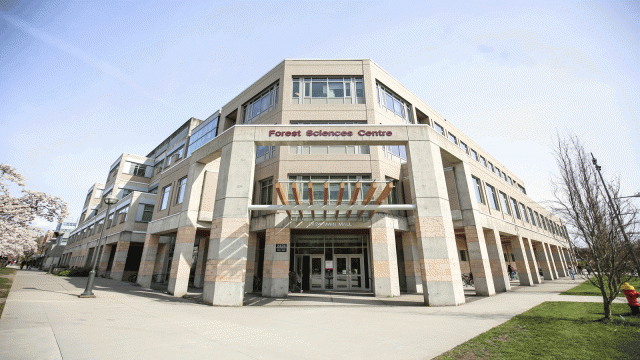Study scientific principles related to forests, forest organisms, and plant and animal ecology. Forest Sciences is based on the principle that forests are complex ecosystems made up of thousands of living organisms and non-living components, and that our use of one part of the forest ecosystem can impact all of the others. This program is a major in the Bachelor of Science in Nature Resources degree.
Why this program?
- Specialize in an area such as genetics, ecology, entomology, pathology, silviculture, or hydrology
- Focus on forest ecosystems in another part of the world with an international specialization
- Earn academic credits toward a Registered Professional Biologist or Registered Professional Forester designation
Program information
Send details- Campus: Vancouver
- Faculty: Faculty of Forestry & Environmental Stewardship
- Degree: Bachelor of Science in Natural Resources
- Length 4 yrs
- Co-op Yes
- Honours Yes
If you have an inquisitive mind and want to unravel the mysteries of nature, Forest Sciences could be for you. As a student in this academically challenging program, you’ll improve your understanding of forest wildlife, fires, insects, diseases, soil, tree genetics, and forest regeneration.
You’ll also learn how to ask and approach important questions like: How do plants and animals in forest ecosystems react to insects and disease, climate change, pollution, harvesting, and recreational use? How can we sustain the biological diversity of our forests while meeting our resource needs?
Experiential learning and research
As a Forest Sciences student, you’ll:
- Complete extensive, hands-on lab or field work.
- Take part in one or two, week-long field schools at the Alex Fraser Research Forest in Williams Lake BC, and the Malcolm Knapp Research Forest in Maple Ridge, BC.
- Honours students will write an original, six-credit thesis under the supervision of a faculty member in your final year.
Campus features
The award-winning Forest Sciences Centre on UBC’s Vancouver campus offers wireless study space, high-tech classrooms, and labs equipped with the latest technology.
The Faculty of Forestry also has two major research forests in British Columbia, and jointly manages a third, altogether totalling 25,000 hectares or more than 60,000 acres.
Send detailsLife at UBC's Vancouver campus
Surrounded by 750 hectares of forest, UBC offers the chance to study in a forested environment. Learn from award-winning faculty members in the nature-inspired Forest Sciences Centre, whose main atrium and study area feature giant live plants and a large skylight supported by massive wood beams. As a Faculty of Forestry student, you'll also have access to two research forests for field schools and other learning opportunities.
Find out moreYour future
Pursue a career as a forest geneticist, a biodiversity specialist, a fisheries and wildlife officer, a forest ecologist, a pathologist, or an entomologist. Many Forest Sciences graduates go on to graduate school and careers in research and teaching. Others acquire professional certifications as Registered Professional Foresters or Registered Professional Biologists.
Program graduates
- Senior Research Associate, Institute for Genomic Diversity, Cornell University
- Instructor, Renewable Resources Management Program, Yukon College
- Yukon College Research Scientist and Tree Breeder, British Columbia Ministry of Forests, Lands, and Natural Resource Operations
Program requirements
English-language requirements
English is the language of instruction at UBC. All prospective students must demonstrate English-language competency prior to admission. There are numerous ways to meet the English Language Admission Standard.
General admission requirements
IB Diploma Programme
- Completed IB Diploma, including at least three Higher Level courses.
IB Certificate Courses
- IB Certificate courses (Standard and Higher Level) may be used in an admissions average if you are graduating from a recognized high school curriculum that can be used as your basis of admission.
- IB Math Applications and Interpretations SL, or IB Math Studies, do not satisfy the math requirement for admission to UBC’s science-based programs, the Faculty of Management, the UBC Sauder School of Business, or the Vancouver School of Economics.
Degree-specific requirements: Natural Resources
- IB Math Analysis and Approaches SL or HL, or IB Math Applications and Interpretations HL. (IB Math Applications and Interpretations SL, or IB Math Studies, are not acceptable.)
- One of IB Biology, IB Chemistry, or IB Physics (see Related courses below)
- Grade 11 or equivalent Chemistry
- Grade 11 Biology (see Related courses below)
- If you intend to major in Wood Products or specialize in Harvest Planning and Engineering (Forest Operations), Physics 11 is strongly recommended.
Note: Grade 11 Biology, Chemistry and Physics requirements listed above are only relevant to students who are not completing the equivalent IB Diploma Biology, Chemistry and/or Physics courses. For students studying outside of Canada, some examples of courses that may be accepted as Grade 11 equivalents are junior-level courses for American students, and IGCSE and O Level for those following British-patterned curricula.
Related courses
The following subject categories are particularly relevant for this degree. Consider taking courses in these areas in Grade 11 and Grade 12.
- Language Arts
- Mathematics and Computation: Calculus is recommended for the Harvest Planning and Engineering specialization.
- Sciences: Biology 11 or IB Biology HL or SL is strongly recommended for all majors and specializations. IB Physics SL or HL is also recommended for the Wood Products major and the Harvest Planning and Engineering specialization.
“
